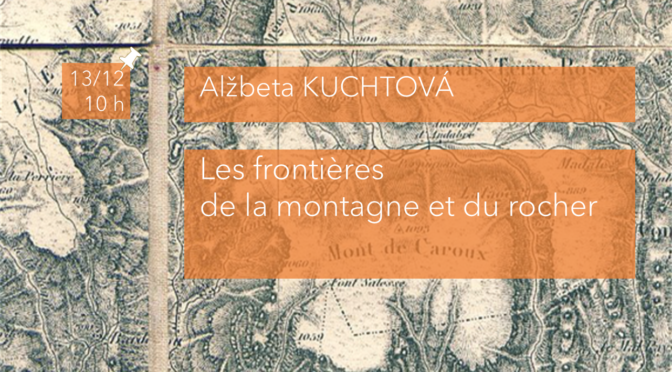
Hranice hor a skal
V rámci čtvrtého sezení mezioborového frankofonního semináře CEFRESu 2024-2025 Mapa a hranice budeme zkoumat otázku samotného vymezování a znázorňování (území, období, trajektorie), tedy budeme uvažovat o mapě a hranicích skrze vzájemné prolínání výzkumných oblastí, jimiž se jednotliví účastníci zabývají.
Kde: knihovna CEFRESu, Na Florenci 3, Praha 1
Kdy: pátek 13. prosince 2024, 10:00–12:00
Jazyk: francouzština
Přednášející: Alžbeta Kuchtová (Slovenská akademie věd)
Diskutující: Iwona Janicka (FLÚ, AV ČR)
Abstrakt Pokračování textu Hranice hor a skal →
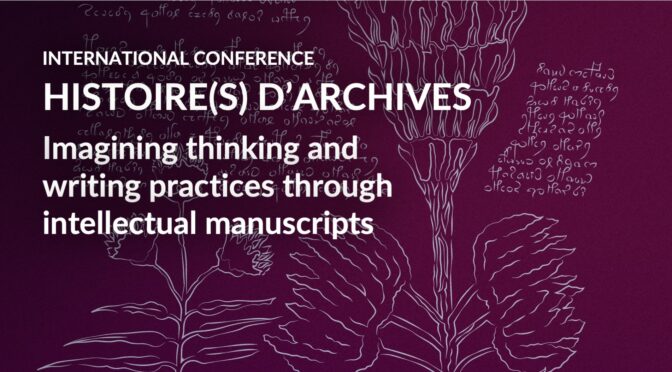
Histoire(s) d’archives: představy o praxi myšlení a psaní prostřednictvím intelektuálních rukopisů
Cílem konference je dát podnět účastníkům společně zvážit, jaké metodiky a digitální nástroje jim mohou pomoci lépe zkoumat práci autorů prostřednictvím jejich dochovaných písemností. Setkání se zároveň snaží navrhnout, jak můžeme výzkum posunout nad rámec toho, co nám tyto texty říkají. Pomocí takovéhoto přístupu by bylo možné lépe rozumět zkoumaným tvůrcům, jejich příběhům a způsobu, jak přicházeli do styku s různými kulturami. S použitím popisované metodiky bychom zároveň mohli lépe pochopit, z jakého kulturního kontextu autoři vychází, jak je ovlivnilo jejich okolí a jaké kolektivní postupy (collective practices) při psaní převládaly mezi jejich současníky. Takový náhled by nám jednak pomohl vidět dějiny idejí v novém světle, zároveň by díky němu ale mohly vzniknout snáze pochopitelné výklady o autorech a jejich dílech v digitální podobě, které by mohly být přístupné pro širší laickou veřejnost. Na konferenci se budou podílet hlávní členové výzkumné skupiny AITIA – Archives of International Theory, An Intercultural Approach.
Kdy: 5.-6. prosince 2024, od 9:30
Kde: 5. 12. CEFRES, Na Florenci 3, Praha 1
6.12 Muzeum Literatury, Pelléova 44/22, Praha 6
Současně bude probíhat online přenos
Jazyk: angličtina
Organizátoři: IRN AITIA, CNRS, CEFRES, Muzeum literatury v Praze, Archiv Jana Patočky
Program
Pokračování textu Histoire(s) d’archives →
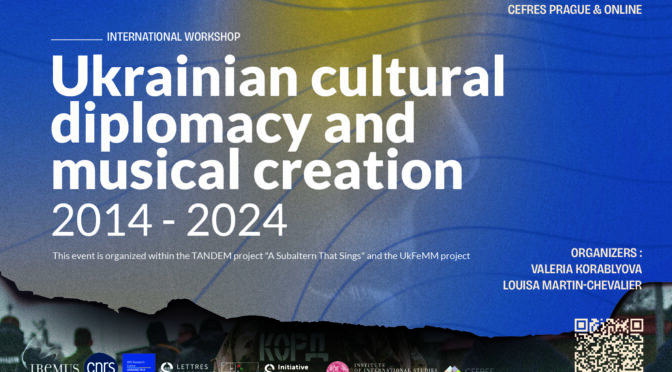
Tato konference je součástí společného výzkumného projektu TANDEM „Subalterna, která zpívá” Valerie Korablyové a Louisy Martin-Chevalier, který se věnuje hudebnímu rozměru ukrajinského odporu jako prostředku k úniku ze subalterní pozice dvojí periferie ve slepé uličce mezi EU a Ruskem.
Datum konání: 27.-29. listopadu 2024
Místo konání: CEFRES, Na Florenci 3, Praha 1
Jazyk: angličtina
Program
Pokračování textu Ukrajinská kulturní diplomacie a hudební tvorba: 2014–2024 →
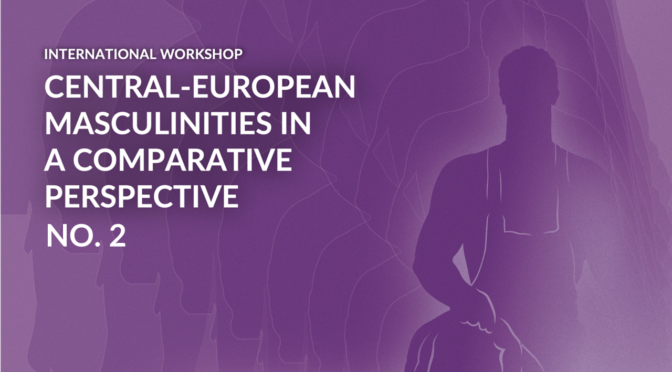
Druhý mezinárodní workshop “Středoevropské maskulinity v komparativní perspektivě”
Druhý mezinárodní workshop pořádaný CEFRES v rámci výzkumného projektu Středoevropské maskulinity, s podporou francouzského Ministerstva pro vysoké školství a výzkum (MESR, program PARCECO), ve spolupráci se Slezskou univerzitou v Katovicích, Ústavem pro českou literaturu AV ČR (ÚČL AVČR) a Katedrou české literatury a komparatistiky FF UK (ÚČLK FF UK).
Místo konání: CINiBA, ul. Bankowa 11a, 40-007 Katowice
Datum: 14. – 15. listopadu 2024
Jazyky: angličtina
Organizátoři: Wojciech Śmieja (IL WNH UŚ), Mateusz Chmurski (CEFRES/Sorbonne), Iwona Kurz (IKP WP UW), Richard Müller (ÚČL AV ČR), Josef Šebek (ÚČLK FF UK), Ivana Taranenková (ÚSL SAV).
Program
Pokračování textu Středoevropské maskulinity č. 2 →
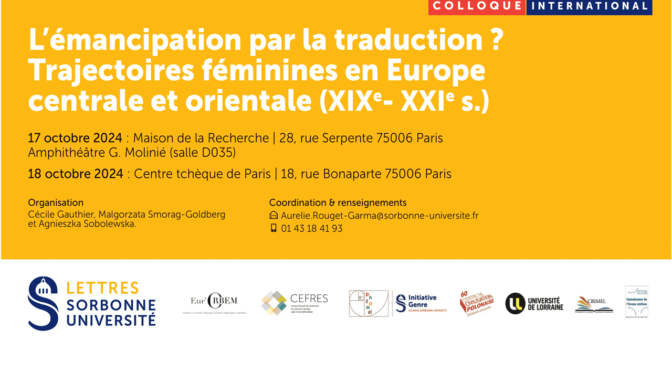
Emancipace překládáním?
Ženské životní dráhy ve střední a východní Evropě (19.–21. století)
Tato mezinárodní konference je součástí cyklu „Ženy a šok(y) emancipace” realizovaného pod záštitou CIRCE / Eur’ORBEM od roku 2022 ve spolupráci s CEFRES.
Datum: 17.-18. října 2024
Místo konání: České centrum v Paříži, ul. Bonaparte 18, Paříž 6e
Jazyk: angličtina, francouzština
Organizátorky: Cécile Gauthier (University of Reims), Malgorzata Smorag-Goldberg (Sorbonne Université) a Agnieszka Sobolewska (Varšavská Univerzita/Sorbonne Université)
Partneři: CEFRES, Eur’ORBEM (CNRS-Sorbonne Université)
Teze konference naleznete pod programem.
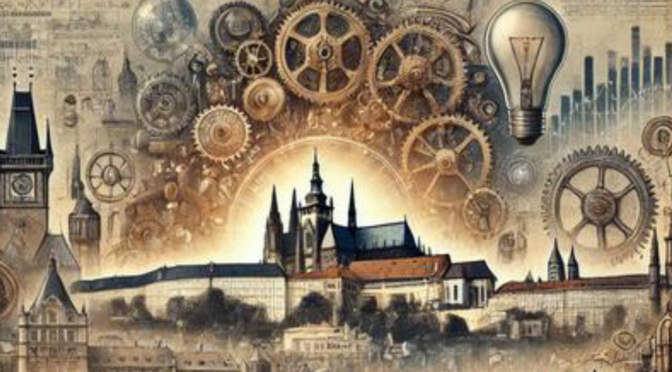
Historické přístupy k technické kreativitě a inovacím
Cílem konference je představit historické přístupy k inovační technice v mnoha oblastech: od soukromých podniků po elektrifikaci, přes dekolonizaci, lokomotivy, hodinářství a ekologické aspekty technologie.
Datum: 3. října 2024
Místo konání: Fakulta elektrotechnická ČVUT v Praze, (Technická 2, Praha 6)
Jazyk: francouzština, angličtina
Organizátor: Fakulta elektrotechnická ČVUT v Praze
Program konference Pokračování textu Historické přístupy k technické kreativitě →






